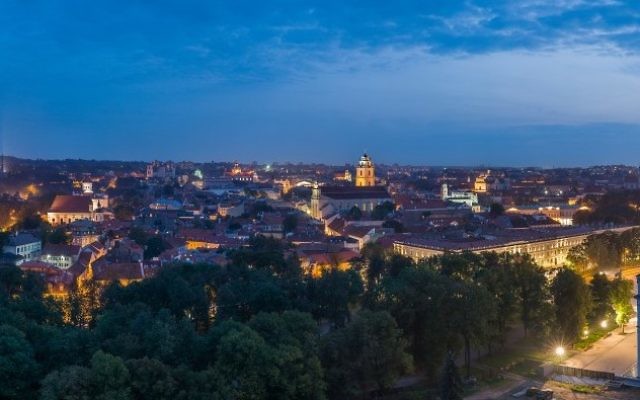Vilnius University to honor Jewish Shoah victims — unless they fought Nazis
Lithuanian body will posthumously award academic degrees to Jewish students murdered in the Holocausts, as long as they weren't partisans
Vilnius University in Lithuania said it would award academic degrees posthumously to Jewish students who were murdered in the Holocaust — unless they were partisans.
In a statement published Wednesday on its website announcing the initiative titled Recovering Memory, the university encouraged relatives of Holocaust victims to apply for recognition through a special procedure set up this year.
But in a twist connected to the Lithuanian state’s complicated attitude to its wartime history, the procedure excludes any Jewish student who fought with communist or pro-Soviet partisans against the Nazis. Diplomas will not be issued “if evidence of collaboration with political and police structures of totalitarian regimes is determined,” the procedure states.
Virtually all resistance movements in Lithuania during World War II were supported or otherwise linked to the Soviet Union.
In Lithuania, both the Soviet Union and Nazi Germany are defined as totalitarian regimes by state historians. Prosecutors in 2008 launched a controversial probe against three Jewish partisans who were suspected of war crimes. The investigation was dropped following an international uproar.
Lithuania is among several Eastern European nations promoting what some historians call the “double genocide” narrative, or the “red brown equivalence,” which is seen as designed to establish a moral equivalence between Nazi Germany and the Soviet Union.
Lithuania is the only country in the world that defines its domination by the Soviets as a form of genocide.
Efraim Zuroff, a Nazi hunter and head of the Israel office of the Simon Wiesenthal centre, has accused Lithuanian officials of pursuing this equivalence to obfuscate the Lithuanian population’s widespread collaboration with Nazi occupation forces, including in the murder of 95 percent of Lithuania’s prewar Jewish population of 230,000.
“It is an effort by the Lithuanian state to paint Lithuania as a victim without coming to terms to the roles of many Lithuanians as perpetrators in the service of the Nazis,” he said.
Academic degrees will be denied also to Holocaust victims if they were dismissed or ended their studies “after Vilnius University was closed by Nazi occupying authorities” on March 17, 1943, the university said, or if they left “voluntarily.”
Students expelled for poor scholastic performance will also not be recognised, nor will those with “certain facts in their biography” that are “incompatible with the content and the concept of the Memory Diploma.”
The decision to offer recognition to students who meet the criteria followed a request last year by an Israeli medical professor, Moshe Lapidot, for recognition of his late uncle, who studied chemistry at the institution before he was murdered in the Holocaust.
Lapidot accepted the diploma for his late uncle, whom he had never met, during a ceremony earlier this month at the Israeli Embassy in Vilnius.
Lapidot’s uncle, Chlaunė Meištovskis, became the first student to posthumously receive a degree — in the uncle’s case, a bachelor of sciences — under the initiative. Archival gaps complicate attempts to identify all the Jewish students on the list of students during the Holocaust years, the statement said.

Thank you for helping to make Jewish News the leading source of news and opinion for the UK Jewish community. Today we're asking for your invaluable help to continue putting our community first in everything we do.
For as little as £5 a month you can help sustain the vital work we do in celebrating and standing up for Jewish life in Britain.
Jewish News holds our community together and keeps us connected. Like a synagogue, it’s where people turn to feel part of something bigger. It also proudly shows the rest of Britain the vibrancy and rich culture of modern Jewish life.
You can make a quick and easy one-off or monthly contribution of £5, £10, £20 or any other sum you’re comfortable with.
100% of your donation will help us continue celebrating our community, in all its dynamic diversity...
Engaging
Being a community platform means so much more than producing a newspaper and website. One of our proudest roles is media partnering with our invaluable charities to amplify the outstanding work they do to help us all.
Celebrating
There’s no shortage of oys in the world but Jewish News takes every opportunity to celebrate the joys too, through projects like Night of Heroes, 40 Under 40 and other compelling countdowns that make the community kvell with pride.
Pioneering
In the first collaboration between media outlets from different faiths, Jewish News worked with British Muslim TV and Church Times to produce a list of young activists leading the way on interfaith understanding.
Campaigning
Royal Mail issued a stamp honouring Holocaust hero Sir Nicholas Winton after a Jewish News campaign attracted more than 100,000 backers. Jewish Newsalso produces special editions of the paper highlighting pressing issues including mental health and Holocaust remembrance.
Easy access
In an age when news is readily accessible, Jewish News provides high-quality content free online and offline, removing any financial barriers to connecting people.
Voice of our community to wider society
The Jewish News team regularly appears on TV, radio and on the pages of the national press to comment on stories about the Jewish community. Easy access to the paper on the streets of London also means Jewish News provides an invaluable window into the community for the country at large.
We hope you agree all this is worth preserving.






















